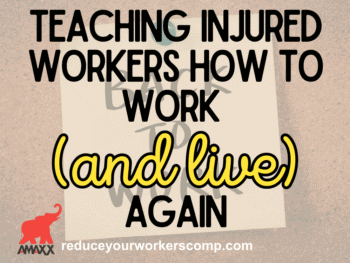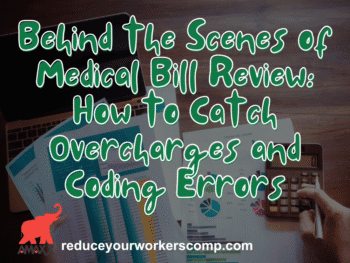
But this goal is harder to attain for some people than others. Adjusters can handle thousands of claims within the timeframe of their career. And it is within the handling of these claims that the adjuster becomes familiar with the non-work-related comorbidities and how they affect the duration of a claim. Below we discuss 6 of the more commonly seen issues and how they can affect the duration of an injury claim.
-
Smoking or other tobacco use
It is not a new revelation that tobacco use can prolong healing. Many occupational studies have been performed that prove that tobacco users can take longer to heal than those who do not use tobacco. One of the first questions the adjuster asks when taking a statement is if the claimant smokes or not. This is done because tobacco users will take longer to heal, which means the claim will last longer and create a need for a higher reserve on the file.
Click Link to Access Free PDF Download
“The 6-Step Process To Determine Workers’ Comp Injury Causation”
-
Diabetes
Another question asked during the claimant statement process will be if the injured worker has diabetes. The positive diagnosis of diabetes will prolong healing, which means a higher reserve will have to be placed in the file. Maybe not so much with a minor strain, but especially true with a bone fracture. Severe injuries with a positive diabetes finding will require the adjuster to keep a close eye on the progress on the file.
Complex fractures with diabetes will often be transferred to a more advanced adjuster familiar with how the treatment process will flow. These claims often are around for a period of months to years and require more complex therapies and costing a lot more than the normal. Onsite nurse case managers will be used to be involved in the recovery process, and to talk to the doctor about how the patient is doing and what roadblocks may be ahead. This is all done in an effort to remain proactive on the claim, and to expect the unexpected should it happen to occur.
-
Obesity
The finding of obesity is usually not viewed as complex as diabetes, but it can lead to prolonged healing depending on the type of injury and the overall body habitus of the injured worker. Moderate to severe lumbar strain claims can hang around longer with obesity than without. However, just because a person is labeled obese does not mean that they are out of shape or generally weak. Sure their back may be weakened due to conditioning issues, but that may or may not have a tangible impact on the claim. More importantly, if the claimant fails to heal within a certain timeframe, the adjuster may ask the treating doctor if the nagging continued pain is due to obesity rather than an acute injury.
This can be hard to prove. The adjuster has to figure out if the claimant has pre-existing back pain, especially if past medical records show evidence of this pain. The doctor will be called on to separate these two issues and make a determination of what is work-related and what is pre-existing.
-
Pre-Existing injury
Using the back as an example, if a person is performing a task and feels back pain, they could have a work comp injury. If this worker was off of work for non-work-related back pain, then comes to work and feels back pain, how does the adjuster know what is work-related and what is not? The only person that will know is the claimant since they are the ones feeling the pain before and after the injury.
Adjusters have to reinforce the fact that just because someone is at work and has pain, this doesn’t 100% guarantee that an injury or pain is work-related. There has to be an isolated event, with a mechanism of injury present to produce the pain. This is where claims can get messy because the worker feels that whatever they did at work is what caused or worsened their pain. On the other hand, if the adjuster finds out that this worker has had a lot of back pain issues or prior comp claims for back injuries, then the adjuster will deem that this worker has a bad back probably from some non-work related issue, and that work is merely exacerbating those issues. Depending on the jurisdiction, this may or may not affect the compensability of the claim. If you as the employer know that your worker has a storied history of back issues, be sure to tell your adjuster. It is usually a safe bet that the claimant may not be so forthcoming with their prior back issues when asked by their adjuster.
-
Medication side effects
A lot of research has been done to show that some medications may not be very helpful with a chronic injury. These meds were used for acute pain in the early stages of a claim. Injured workers placed on strong levels of medications for months and months build a tolerance to the med, and their complaint will be that they feel no relief from the medication after a few months. So they take more, which can open the door to potential addiction issues. Adjusters have been warned that injured workers taking strong opiate meds need to be monitored very closely, both with dosage and with urine tests, to make sure they are not taking more than prescribed or obtaining other types of opiate medications from other treating physicians.
-
Depression
The diagnosis of depression can mean several things, with varying severity. When an injury occurs adjusters will send a medical release over to the claimant to sign, so they can obtain medical records from their primary care doctor. When receiving these records adjusters will review the medical notes looking for anything that can contribute to a claim, be it occupational in nature or not. Insurance carriers have started to notice that a lot of functional workers also have a diagnosis of depression, usually treated with medication.
Comparisons are starting to show that those with underlying depression issues can also have delayed healing times, for a multitude of reasons. This is somewhat of a new issue in the world of work comp, and it is one to keep an eye on. On the surface, if you make a blanket assumption, one would think if a person has depression that this could delay their healing, but again it is not always the case. It could be safe to assume that it can impact the file negatively, and it should be noted in the file, but I have seen cases both ways. The important thing is that it is noted properly in the file, in case it does come in down the road as a barrier to healing, whether physical or psychological in nature.
Summary
Every day there are workers injured on the job. It is difficult enough as an injured worker to deal with getting the medical help you need to get better, combined with income loss and the stress of dealing with being in pain. When you add the factors above along with the injury, you can see how the injured worker can become frustrated and have increased anxiety with the whole claims process.
It is important for adjusters to properly note the issues above, and how they can negatively impact a claim, especially on the reserving aspect. It is not to say that if a worker has one or more of the above that they are doomed and will never get better and never return to work. Chances are they will return to gainful employment, It just may not be as quickly as either party had anticipated.
 Author Michael Stack, CEO Amaxx LLC. He is an expert in workers’ compensation cost containment systems and helps employers reduce their workers’ comp costs by 20% to 50%. He works as a consultant to large and mid-market clients, is a co-author of Your Ultimate Guide To Mastering Workers Comp Costs, a comprehensive step-by-step manual of cost containment strategies based on hands-on field experience, and is the founder & lead trainer of Amaxx Workers’ Comp Training Center, which offers the Certified Master of Workers’ Compensation national designation.
Author Michael Stack, CEO Amaxx LLC. He is an expert in workers’ compensation cost containment systems and helps employers reduce their workers’ comp costs by 20% to 50%. He works as a consultant to large and mid-market clients, is a co-author of Your Ultimate Guide To Mastering Workers Comp Costs, a comprehensive step-by-step manual of cost containment strategies based on hands-on field experience, and is the founder & lead trainer of Amaxx Workers’ Comp Training Center, which offers the Certified Master of Workers’ Compensation national designation.
Contact: mstack@reduceyourworkerscomp.com.
Workers’ Comp Roundup Blog: https://blog.reduceyourworkerscomp.com/
©2021 Amaxx LLC. All rights reserved under International Copyright Law.
Do not use this information without independent verification. All state laws vary. You should consult with your insurance broker, attorney, or qualified professional.





























The adjuster’s main reason for asking of someone smokes is to monitor the normal time treatment guidelines will allow for certain procedures and if the adjuster feels that the procedure should have alleviated the pain but for the fact that the claimant smoke, the will deem that disability continues due to a pre-existing condition and will use that to either not authorize more treatment of checks or both and not for any benevolent reason.